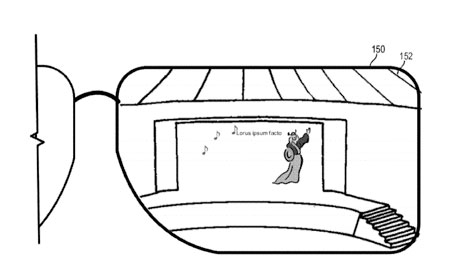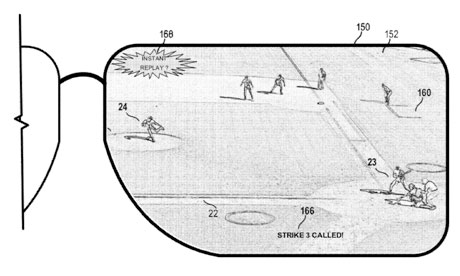Microsoft has been given a patent on "augmented reality" (AR) glasses that would enhance sports and other live events with streams of information beamed directly in front of the user – even including action replays and lyrics of songs.
The move means that it could soon join Google in offering AR systems for widespread use, after the search giant unveiled its own Google Glass project earlier this year, intended to be used all the time as the user goes about their daily life.
And the AR business is expected to be worth a lot very soon: according to the consultancy Mindcommerce, which suggests that AR revenues will exceed $3bn by 2015, that mobile commerce revenues will be doubled by 2015 with AR applications, and that mobile phone AR applications will generate $2.2bn of revenues in the same year.
Apple too has got patents for an AR system, granted in February 2010, which would work with a "handheld communication device" – though Patently Apple, which follows every patent granted to the Cupertino company, notes that it was granted a patent as far back as 2009 (and filed in 2007) for a head-mounted video player – though expectations then that "we can see that Apple's next bold move in their iPod family could very well be the introduction of an iPod video headset display" turned out to be wide of the mark.
Microsoft is clearly aiming at a broad market with its "live event" idea: the USPTO patent, filed in May 2011, describes:
A computer implemented method providing supplemental information to a user with a head mounted display viewing a live event, comprising: receiving an indication that a user is attending a live event, the live event having an event duration; determining a field of view of the user through the head mounted display, and objects within the field of view at the live event; retrieving supplemental information describing at least the objects in the field of view of the user during a portion of the live event; determining elements of said supplemental information to present to the user in the head mounted display; and displaying the supplemental information in one or more display elements in the head mounted display.
 Microsoft suggests that its AR glasses could add lyrics during a live performance
Microsoft suggests that its AR glasses could add lyrics during a live performance In other words, taking in what is in the field of view and adding data to it through the system you're using to view it. The examples given are sports events and singing (apparently opera), but since Microsoft has recently demonstrated live language translation to and from Chinese, the phrase "live event" might actually be much wider than just sports. A "live event" is just something you happen to be doing - it doesn't have to involve sports or singing.
 Microsoft says it would be able to offer instant replays directly through its AR glasses, as well as annotating what's happening on the field
Microsoft says it would be able to offer instant replays directly through its AR glasses, as well as annotating what's happening on the field And AR is beginning to get into a growing number of devices – principally, for now, smartphones. Nokia's Lumia range with Windows Phone 8 includes "City Lens" which shows the distance and approximate direction of places of interest arranged on the screen when you hold it up. Layar has been offering AR for Android and the iPhone for years (I first wrote about the field in July 2009).
In September, Juniper Research forecast that there will have been 2.5bn downloads of AR apps to smartphones and tablets each year by 2017; for brands looking to push their products, it's a great way to get in front of people (and Google's first video for Glass did suggest that advertising might be quite a common feature of the systems).
Google, as is well known, is pushing ahead rapidly with Google Glass – Sergey Brin, the co-founder of Google, showed off the latest version of the system at Google I/O in May, and the company has said that it will start selling prototypes to developers starting in 2013.
With Microsoft and Google going head-to-head – or maybe face-to-face – in AR glasses, perhaps it will be inevitable that Apple will join in, to create a fresh platform as the touchscreen smartphone starts to look dated.
But that raises further questions straight away: will Google keep a monopoly on Glass, or will Android licencees such as Samsung be allowed to participate – and if they do, will they want to tweak the glasses in their own way? What can Microsoft do with what is essentially a smartphone with attached glasses if it doesn't have any significant smartphone share – or would this help it along? And, ultimately, will AR glasses improve our world or just be another distraction – to add to the one we already have from the screens of our smartphones?
No comments:
Post a Comment